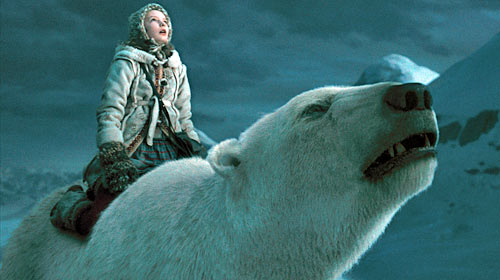
I am a fan of fantasy novels so naturally I found this book intriguing, but I personally do not think it was amazing. I cannot place this on the same level of Harry Potter, Lord of the Rings and other works I truly enjoy. I do not mean to say the book is not good though. I would have to say a respectable level of originality is present in the book and it was refreshing in that way. I enjoy how the protagonist is a young girl who actually wants to go head first into danger versus the typical hero who is essentially thrust into a situation they would rather not be a part of. This fact carries the book well since the main idea behind her character development is making mistakes and learning from them.
The concept of daemons as souls is an interesting approach to creating an alternative universe. I can see how this raises some controversy with religious groups. The fact one's soul is physically manifested in a creature and that there are alternative universes would indeed raise some eyebrows. Personally I am not a fan of people who take a piece of fictional literature too serious and turn it on the author in a negative way. This goes the same for those who blame video games for any violent act done by a youth. Anyways...
I think the alethiometer is a creative tool for adventure. This plays in part to the fact that this society seems to hold science on a higher pedestal than religion. Scholars are revered individuals who seem to pride themselves on the pursuit of knowledge and the sciences. The fact a scientific device can give you the truth to any question brings to light the whole issue of destiny versus free choice. Just the idea of being able to know who is doing what at any time leads me to believe there is no such thing as free choice in this particular universe. Personally I am not a fan of characters with too much power, however it is not like she is unstoppable or unbreakable. Characters like Dr.Manhattan from The Watchers is an example of a character with too much power and I dislike this.
The characters in this book are great. I particularly like the polar bears and Iorek Byrnison. The section regarding Iorek and Ragnar is great. I found it interesting that the bear king wanted a daemon and was even tricked into believing Lyra was one. This raises a few questions. Firstly, why would a presumably intelligent being think that Lyra is a daemon? She is obviously human, and Ragnar has surely made acquaintances with other humans considering he knows about daemons. Which leads to my next question: Could a daemon take on the form of a human? I enjoy books that can rattle my brain like this. Anything with moral, ethic, existential or metaphysical quandaries and questions will immediately peak my interest.
Ultimately I found this book to be an enjoyable source of entertainment that is not only fantastical but scientifically driven as well. I wish I had not seen the movie before reading the book so that I could have created my own imagery through my own imagination instead of already having some exposure to someone else's interpretation. If I have the time I would like to read the last two books. I would also like to see them made into movies.

